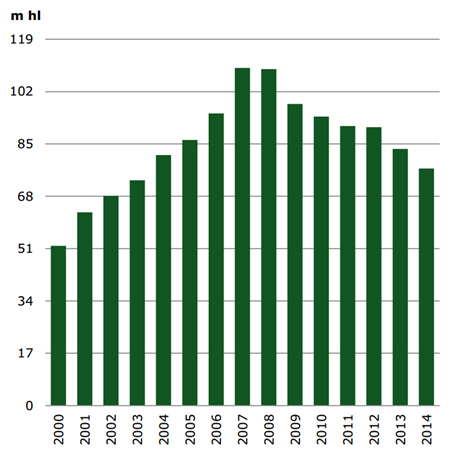Carlsberg’s CEO retires
Would the Kremlin know or care that its politics made a Danish CEO lose heart? Carlsberg announced on 18 February 2015 that its CEO Joergen Buhl Rasmussen, 59, will retire on 15 June this year and be replaced by Cees ’t Hart amid reports of a weakening Russian ruble plus declining beer sales in Russia and the Ukraine, which led to a sharp drop in the brewer’s fourth-quarter profits.
To outsiders, the timing of the succession may seem a bit odd. There is a crisis brewing in Carlsberg’s biggest market, its profits have dropped massively in the previous quarter, and yet its CEO choses to retire.
However, to Carlsberg-watchers, the CEO’s tenure had already turned precarious in the autumn when the Danish brewer released third quarter results. They did not look all that bad considering the news coming out of Russia and the Ukraine, but when in December, Dr Isaac Sheps, the head of Carlsberg’s Russian unit left, pundits knew that some shareholders were getting restless.
Actually, all shareholders should have been worried. Carlsberg’s net profit in the three months to 31 December 2014 came in at DKK 278 million (USD 42 million), down from DKK 1.25 billion year-on-year. Revenues in the period dropped 8 percent to DKK 14.33 billion from DKK 15.66 billion a year earlier, while beer volumes fell 5 percent organically.
It isn’t fair to blame the CEO alone for Carlsberg’s plight. For seven years, Mr Rasmussen has fought a tough battle as sales in Russia, where Carlsberg’s Baltika is the market leader, had been affected by tighter regulations and more recently Western sanctions.
But it appears that several powerful shareholders thought a change of face at the top would send out the right signal: “take heart, Carlsberg is on the right track”.
With Mr ’t Hart, 56, Carlsberg is getting its first non-Danish CEO. The Dutchman ’t Hart joins from the dairy company Royal FrieslandCampina NV, where he has been CEO since the end of 2008. Previously he worked at Unilever for 25 years.
The new CEO will need to guide the brewer through tough conditions. Carlsberg also warned that the expected GDP decline and currency devaluation in Russia and Ukraine would put significant pressure on the group’s overall performance this year.
To counter the downbeat outlook for the region, the company, which generates about 27 percent of its sales in Eastern Europe, said it would cut costs.
Carlsberg expects to deliver “mid- to high-single-digit” organic operating profit growth in 2015.
“Clearly, the Eastern European business is working on different scenarios and plans that can be executed if the environment changes,” the brewer said in a statement.
Russian beer market declines in 2014
Keywords
Denmark Russia international beverage market
Authors
Ina Verstl
Source
BRAUWELT International 2015

